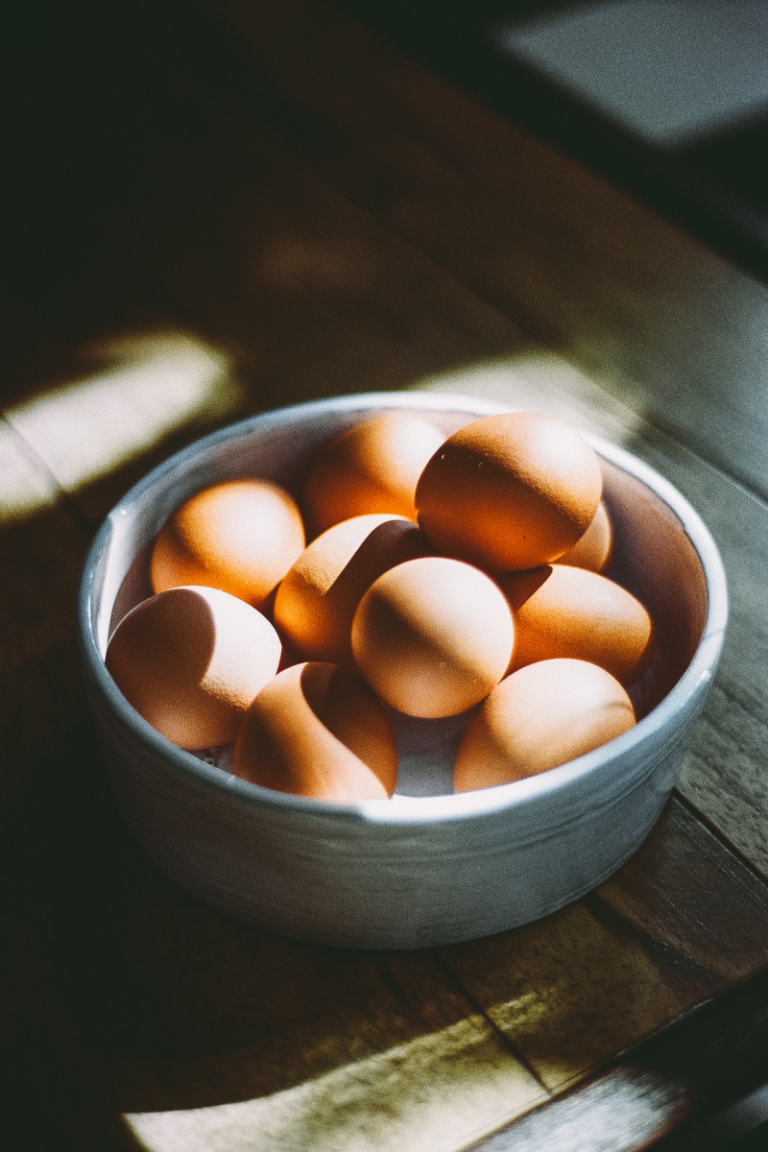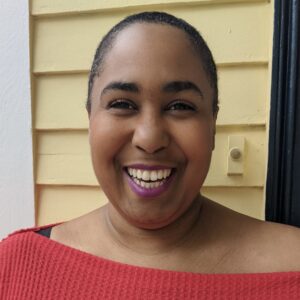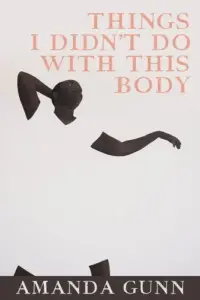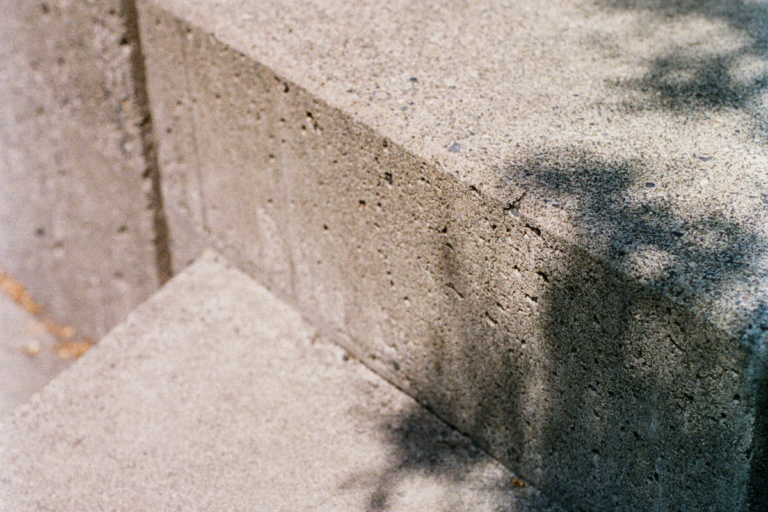Amanda Gunn
Ordinary Sugar
A note from the Poetry Unbound team:
We’ve updated the audio for our episode “Amanda Gunn — Ordinary Sugar.” This updated version includes an additional stanza initially omitted from the recording and additional reflection from Pádraig.
How can russet potatoes be made to taste of sugar and caramel? By dedication, love, and craft. Amanda Gunn places her poetry in conversation with the farming and culinary skills of her forebears: women who cultivated land, survival, strength, and family bonds.
We’re pleased to offer Amanda Gunn’s poem, and invite you to connect with Poetry Unbound throughout this season.

Image by Annisa Hale/Film processed by Moody's Film Lab, © All Rights Reserved.
Guest

Amanda Gunn grew up just at the edge of the woods in southern Connecticut with two older brothers. She is a Wallace Stegner Fellow at Stanford, as well as a PhD candidate in English at Harvard where she studies poetry, ephemerality, and Black pleasure. Her recent work appears in Poetry, Los Angeles Review of Books Quarterly Journal, and Narrative Magazine. Photo credit: Moon Duchin.
Transcript
Transcription by Alletta Cooper
[music: “Praise the Rain” by Gautam Srikishan]
Pádraig Ó Tuama: My name is Pádraig Ó Tuama and whenever I write a recipe out for a friend I normally put some little extra delicious details in there about when you should do a little dance or what kind of music should be on. Because I feel like a recipe is an opportunity in writing to give some tools for survival as well as maybe a couple of quantities. But normally I’m fairly vague on quantities in recipes I write out.
But recipes are an old form of poetry, and I think a recipe and a poem each have a measure at the heart of them — a measure about pain, a measure about love, a measure about pleasure, or about survival. They’re giving a certain form of instruction that can turn you either towards the deliciousness of food or the deliciousness of language, that can help you look at your own life and feel like you’re finding something from it in the engagement with the writing.
“Ordinary Sugar” by Amanda Gunn
“Aunt Mary made graham
cracker cake without
measuring cups, divided
one pound light
brown sugar with a knife,
half for the cake and half
for the pearlescent
hand-beaten, double-boiled
icing. Aunt Earline made
yellow cake with frosting
of real fudge—234 degrees
and all, slow cooled, poured
just before the rapid and
irrevocable hardening.
Ordinary sugar coaxed
to its epiphany.
“An heir to their confectionary
sleight of hand, I keep
their notes pressed in a book
and safe. Sugar is poison
to my arthritic knees,
but their recipes will rest,
nonetheless, pristine,
not spoiled with things that
just seem sweet. I’ll make
savory dishes out of what
grows green, what snaps
pleasurably, what must,
after twice the loss
of such women, be plenty.
“Of Grandma Mattie, sugar
alchemist, it is said, if they
were all she had to hand,
she could make sweet potato
pie out of russets. Seduce
their pale starches until they
tumbled into caramel.
What the loving living tell.
I remember her gleaming
glass eye, her pregnant
wordlessness, her spinning
through the kitchen hot
and fast. Too, the ruthless
manic canning, putting by,
putting by, against memories
too near starvation—the
machine in her belly built
to last. I do not have preserved
“in my book how she seasoned
her pear chow-chow or trapped
the summer gardens her labors
made lush. I know only that
she fed the earth her eggshells
and morning coffee grounds,
that she harvested continually
and in fullness, the tender skins
near breaking, near sugar,
always before the chill. Not one
bite lost. She’d mastered,
in a life, how to grow
a winter meal, to till, to weed,
to water, to tend, learned how,
I hope, to be satisfied.
“Help me, Lord, to be satisfied.
I was born impatient, under
a vibrating star. But my mother
taught me gently, before
it ached us both to stand,
how to slice fat into cold flour,
sprinkle ice water by tablespoons,
form a perfect discus of dough
without touching it. Unfurl
the crust from a good
French pin. Brush with milk.
A proper flute. Taught me,
too, how to discern and sort
and sugar down the fruit,
and when to fill the plate,
and when to wait, instead,
for the juice to come in.”
[music: “Ashed to Air” by Gautam Srikishan]
I love the three characters in the poem. Aunt Mary, Aunt Earline, and Grandma Mattie. And then, of course, Amanda Gunn’s voice in it too. Aunt Mary and Aunt Earline seem almost to be pitted against each other, not necessarily in personality, but in style of cooking. Aunt Mary doesn’t measure the sugar, she divides “one pound light / brown sugar with a knife.” And then Aunt Earline has this great precision in 234 degrees for the fudge, “slow cooled, poured / just before the rapid and / irrevocable hardening.” These two aunts both seem to have a great love of sugar. So do I. And nonetheless, they seem to approach the question of cooking in a very different way, or certainly, that’s the way they’re characterized in the poem.
And then Grandma Mattie is a “sugar / alchemist” also. And she’s also thrifty and quiet, and she has suffered a lot. She spins and puts by, puts by. There’s memories of starvation in her story. She’s a gardener and a preserver, and a recycler, and a harvester. She knows how to tend the earth. She knows how to make a winter meal, and she’s ruthless in her provision and her providing for people she loves, and she has filled the bellies of other people with what she’s done the whole year round. Knowing when to plant, knowing when to harvest, knowing how it is to feed people from stuff she’s grown during a time when nothing’s growing anymore.
“The / machine in her belly built / to last.” What is that machine? A machine that has known starvation and in a certain sense is saying, “I won’t let anybody around me know this kind of hunger.” That her giving of food was an economy, a business, an agricultural intelligence, and an absolute commitment to saying, “I won’t let anybody go through what I went through.”
[music: “Ashed to Air” by Gautam Srikishan]
There’s so many indications in this poem of specifics about cooking, such that the poem really is in conversation with a form of writing that is a recipe. You know, there’s the “one pound [of] / light brown sugar” and “hand-beaten, double-boiled,” “yellow cake,” “234 degrees,” “real fudge,” “slow cooled,” rapid hardening, “caramel,” “canning,” “pear chow-chow,” “sweet potato,” and then “russets” as well. The capacity to be able to “seduce” the starches of a russet potato until it tumbles into caramel. What an amazing level of knowledge about food that’s everywhere throughout this brilliant poem and looking through food into saying: What does this tell us about a life? What does this tell us about the lives of women who were put into situations where it wasn’t just about survival, but it was about the engagement of pleasure?
And this poem is — it’s delicious to say. I also find myself a little bit hungry when I read the poem out loud. I’m salivating as I say some of these words. I want to taste some of those pies and taste some of that fudge. And what Amanda Gunn is doing in this poem is giving — if you’re reading the poem or listening to it — giving you pleasure while you’re saying it.
And throughout the poem, there’s a desire in the midst of praising these forebears, there’s a desire too, to hope that they knew something of satisfaction. The poem ends by saying “She’d mastered, / in life, how to grow / a winter meal, to till, to weed, / to water, to tend, learned how, / I hope, to be satisfied.” Just those two words there towards the end, “I hope.” You hear the speaker of the poem, Amanda Gunn saying, I hope in the midst of all of the extraordinary industry that she knew, and that in the midst of the exhaustions and demands that she knew what it was like to be satisfied with her own labor, and perhaps satisfied, too, with the product of her labor: the sugar, the sweetness that she was able to bring in, into a life that sometimes didn’t seem so sweet.
[music: “Ashed to Air” by Gautam Srikishan]
This is a poem that, to my mind, suggests memories of what it was like to be a child but written from the point of view of somebody who’s a little bit older now. “Sugar is poison / to my arthritic knees,” the second stanza says. And you hear that this speaker of the poem can’t partake anymore in sugar, but yet is knowing what it was that sugar represented and that sugar represented care and love and pleasure in the midst of hardship as well as precision and skill and intuition. And all of these things, the ordinary sugar of these things, can be turned into so much.
I feel like this is a poem in praise of poetry too, because this is somebody that’s taking words and words that do deal with some difficulties. “Putting by / putting by, against memories / too near starvation.” It’s taking words like that and putting them into something absolutely delicious to say: There’s sweetness in these words. There’s a reclamation, almost, to say that in the midst of things that were taken away, these forebearers of mine, these foremothers of mine knew what it was to speak about sweetness. And she is saying, even though she can’t take sugar, she is taking words and putting sweetness into the words, into the hearing of them, into the speaking of them, into the meaning of them.
The poem takes an interesting turn toward the end, and moves towards a prayer, a prayer for satisfaction, interestingly. It’s like a grace after a meal, but also a grace for a life. She says that she was “born impatient, under a vibrating star,” and there’s an indication of time and a relationship with time here, to speed it up. You can’t make anything cook faster than it’s going to cook, and so there’s a juxtaposition here, really, between the art of learning how to cook and to bake and to watch something bake in its own time, as well as a desire to achieve. And that change of time is held together by the mother’s gentle teaching, the teaching about how to wait for juice, how to share abundance, how to be patient, how to be present. The poem rises like a prayer at the end, but also rises like dough, or rises like something that is cooking in an oven. And we’re brought into a great resolve, into a meeting of somebody who has deep desire for achievement, holding that together with the lessons learned through time, through these foremothers of hers, her own mother, the grandmother, the aunties.
[music: “Ashed to Air” by Gautam Srikishan]
There’s a few parts in the poem where the language really lifts itself up into something that almost seems like a hymn. “Ordinary sugar coaxed / to its epiphany.” And then later on, “What the loving living tell.” “Putting by, / putting by, against memories / too near starvation.” “Not one / bite lost. She’d mastered, / in a life, how to grow / a winter meal.” “Learned how, / I hope, to be satisfied.” These sections of the poem, I think, lift themselves out of the detail about sugar and look at what does it mean to live a life well, in love with the people around you, in provision with the people around you? And what does it mean now for the poet who has inherited all of these memories from these forebears? What does it mean for her to bear witness to them, to honor them, and for her in her craft too, to bear witness through language to the sweetness of memory?
[music: “Ashed to Air” by Gautam Srikishan]
“Ordinary Sugar” by Amanda Gunn
“Aunt Mary made graham
cracker cake without
measuring cups, divided
one pound light
brown sugar with a knife,
half for the cake and half
for the pearlescent
hand-beaten, double-boiled
icing. Aunt Earline made
yellow cake with frosting
of real fudge—234 degrees
and all, slow cooled, poured
just before the rapid and
irrevocable hardening.
Ordinary sugar coaxed
to its epiphany.
“An heir to their confectionary
sleight of hand, I keep
their notes pressed in a book
and safe. Sugar is poison
to my arthritic knees,
but their recipes will rest,
nonetheless, pristine,
not spoiled with things that
just seem sweet. I’ll make
savory dishes out of what
grows green, what snaps
pleasurably, what must,
after twice the loss
of such women, be plenty.
“Of Grandma Mattie, sugar
alchemist, it is said, if they
were all she had to hand,
she could make sweet potato
pie out of russets. Seduce
their pale starches until they
tumbled into caramel.
What the loving living tell.
I remember her gleaming
glass eye, her pregnant
wordlessness, her spinning
through the kitchen hot
and fast. Too, the ruthless
manic canning, putting by,
putting by, against memories
too near starvation—the
machine in her belly built
to last. I do not have preserved
“in my book how she seasoned
her pear chow-chow or trapped
the summer gardens her labors
made lush. I know only that
she fed the earth her eggshells
and morning coffee grounds,
that she harvested continually
and in fullness, the tender skins
near breaking, near sugar,
always before the chill. Not one
bite lost. She’d mastered,
in a life, how to grow
a winter meal, to till, to weed,
to water, to tend, learned how,
I hope, to be satisfied.
“Help me, Lord, to be satisfied.
I was born impatient, under
a vibrating star. But my mother
taught me gently, before
it ached us both to stand,
how to slice fat into cold flour,
sprinkle ice water by tablespoons,
form a perfect discus of dough
without touching it. Unfurl
the crust from a good
French pin. Brush with milk.
A proper flute. Taught me,
too, how to discern and sort
and sugar down the fruit,
and when to fill the plate,
and when to wait, instead,
for the juice to come in.”
[music: “Praise the Rain” by Gautam Srikishan]
Chris Heagle: “Ordinary Sugar” comes from Amanda Gunn’s book Things I Didn’t Do with This Body. Thank you to Copper Canyon Press who gave us permission to use Amanda’s poem. Read it on our website at onbeing.org.
[music: “Praise the Rain” by Gautam Srikishan]
Poetry Unbound is: Gautam Srikishan, Eddie Gonzalez, Lilian Vo, Lucas Johnson, Amy Chatelaine, Kayla Edwards, Annisa Hale, and me, Chris Heagle.
Our music is composed and provided by Gautam Srikishan and Blue Dot Sessions.
This podcast is produced by On Being Studios, which is located on Dakota land. Open your world to poetry with us by subscribing to our Substack newsletter. You may also enjoy Pádraig’s new book, Poetry Unbound: 50 Poems to Open Your World. For links and to find out more visit poetryunbound.org.
Books & Music
Recommended Reading
-

Things I Didn’t Do with This Body
The On Being Project is an affiliate partner of Bookshop.org and Amazon.com. Any earnings we receive through these affiliate partnerships go into directly supporting The On Being Project.








Reflections